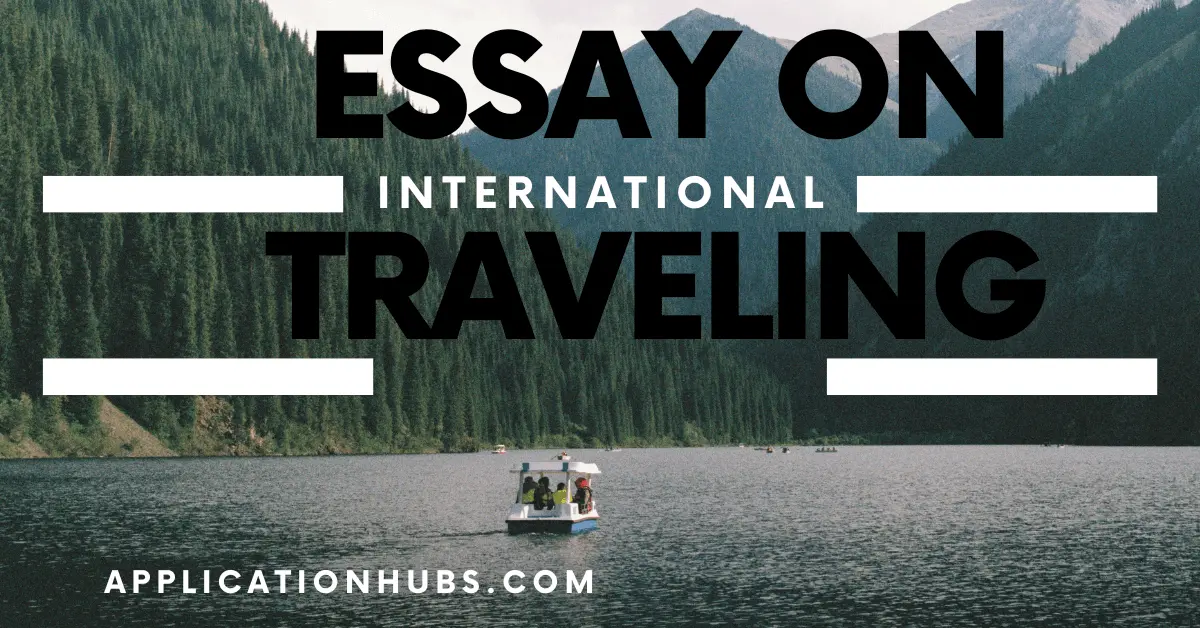Embark on a transformative journey through a 900+ words of essay on travel in English, exploring how summer vacations enrich life. Discover how exploration broadens perspectives, fosters personal growth, and unveils the world’s cultural tapestry.
Essay On Travel In Points For Classes 1–5
- Travel broadens the mind and is crucial for personal growth and development.
- It offers an opportunity to experience one-of-a kind cultures, cuisines, and lifestyles.
- Travel permits a ruin from events and opens the mind to new ideas and perspectives.
- It fosters a sense of independence and self-reliance as one navigates through unfamiliar territories.
- Exploring new locations can be a way to loosen up and recharge away from the pressures of everyday life.
- Traveling allows for the creation of lasting reminiscences and experiences that enrich one’s life.
- It offers the chance to undertake oneself and step out of one’s relief zone.
- Experiencing unique landscapes and natural wonders can be awe-inspiring and humbling.
- Travel can additionally foster connections with humans from one-of-a kind backgrounds and nationalities.
- Overall, a tour is an enriching and rewarding recreation that can open one’s eyes to the splendor and range of the world.
Essay On the Advantages and Disadvantages of Traveling For Classes 6–10
Introduction
Traveling is a superb trip that approves us to explore new places, cultures, and people. It broadens our horizons, opens up our minds, and offers us memories that ultimate a lifetime. However, with every effective element of travel, there are also some disadvantages. In this essay, we will explore the blessings and hazards of traveling.
One primary gain of traveling is the probability it provides to learn about new cultures and traditions. It approves us to acquire a broader viewpoint on the world and understand how one of a kind human beings live and interact. This can be a very enriching experience that brings private boom and focus of diversity.
Advantages
Traveling additionally has the advantage of offering a damage from the every day activities and offering a risk to loosen up and rejuvenate. It allows us to escape from the stresses of work, study, or pursuits existence and to immerse ourselves in a new environment the place we can unwind and revel in new experiences. This can be a great way to recharge our batteries and return home with renewed energy and inspiration.
Another advantage of visiting is the capacity to create lasting memories. From traveling to well-known landmarks and natural wonders to indulging in local delicacies and taking part in special experiences, journeying presents the chance to make unforgettable reminiscences that can be cherished for years to come.
“To travel is to discover that everyone is wrong about other countries.” – Aldous Huxley
However, travelling additionally has its disadvantages. One of the primary drawbacks of touring is the fee involved. Whether it is the price of transportation, accommodations, dining, or activities, journey can be a tremendous financial investment. This can be a deterrent for many individuals, particularly those on a tight budget.
Disadvantages
Another disadvantage of visiting is the threat of encountering unfamiliar or risky situations. While most tour experiences are secure and enjoyable, there is usually the opportunity of running into unforeseen challenges, such as getting lost, getting sick, or encountering destructive weather conditions. This can cause stress and anxiety and may also even dampen the travel experience.
Furthermore, visiting can additionally be physically exhausting. From lengthy flights and train rides to infinite on foot while sightseeing, travel can take a toll on our bodies. This can lead to fatigue and discomfort, which may additionally detract from the average enjoyment of the trip.
Conclusion
In conclusion, visiting comes with both advantages and disadvantages. While it presents the risk to learn, relax, and create lasting memories, it additionally entails good sized costs, doable risks, and bodily exhaustion. Nevertheless, for many people, the rewards of tour a long way outweigh the drawbacks. So, no matter the disadvantages, traveling continues to be a popular and cherished exercise for human beings round the world.
900+ Words of Essay on Travel for Classes 11, 12,…
Introduction
Travel is a vital component of human existence and has evolved drastically over the centuries. From historic civilizations to the modern-day world, the human desire to discover new places, meet new people, and ride specific cultures has driven the improvement of the tour industry. This essay will explore the historical context, key figures, and impact of travel, as well as perceive and analyze influential humans who have contributed to the field. The essay will discuss more than a few perspectives and supply a well-reasoned evaluation of the high quality and terrible components of travel, while also thinking about manageable future developments associated with the industry.
Historical Context of Travel
Travel has been a part of human civilization for hundreds of years. The earliest forms of travel were motivated by the desire for survival; human beings migrated in search of food, shelter, and better living conditions. As societies started to form and exchange routes were established, travel grew to have the potential to expand knowledge, culture, and commerce. The Silk Road, for example, linked the East and the West, facilitating the exchange of goods, ideas, and technologies.
A significant turning point in the history of travel occurred during the Age of Exploration in the 15th and 16th centuries. The Americas, Africa, and Asia were colonized as a result of the exploration efforts of explorers like Ferdinand Magellan, Vasco da Gama, and Christopher Columbus. This generation observed the growing trend in international trade, the transcontinental exchange of illnesses, crops, and animals, as well as the expansion of European influence globally.
Key Figures in the History of Travel
Throughout history, there have been a number of key figures who have notably impacted the discipline of travel. Marco Polo, an Italian merchant and explorer, is renowned for his travels along the Silk Road to China in the late thirteenth century. His written money owed from the Far East stimulated generations of explorers and merchants and played an essential role in promoting cultural change between East and West.
“Adventure is worthwhile in itself.” – Amelia Earhart
Another influential figure in the history of travel is Ibn Battuta, a Moroccan pupil and explorer who embarked on a ride across the Islamic world and beyond in the 14th century. His widespread travels, meticulously documented in his work “Rihla,” grant valuable insights into the societies, cultures, and traditions of the locations he visited, shaping the appreciation of the medieval Islamic world.
Impact of Travel
The impact of this journey on societies, economies, and humans has been profound. The change of ideas, knowledge, and applied sciences via journey has contributed to the development of civilizations and the enrichment of cultures. Travel has facilitated the unfolding of religious beliefs, scientific discoveries, and creative expressions, fostering global interconnectedness.
The travel enterprise has also played a necessary role in financial growth and development. Tourism, in particular, has emerged as a vast source of earnings for many countries, stimulating infrastructure development, job creation, and cultural preservation. In 2019, the tour and tourism enterprise contributed 10.3% of global GDP and supported 330 million jobs worldwide, highlighting its full-size economic impact.
Influential Individuals in the Travel Industry
In recent years, influential individuals in the tour industry have played a pivotal role in shaping the way humans tour and journey the world. Richard Branson, the founder of Virgin Group, has been an outstanding discernment in the airline and hospitality sectors, revolutionizing the tour ride with his modern approach to client service, entertainment, and environmental sustainability.
Elon Musk, the founder of SpaceX and Tesla, has made big contributions to the advancement of space travel and sustainable transportation. Musk’s imaginative and prescient vision for the future of travel consists of interplanetary colonization and high-speed terrestrial transportation systems, such as the Hyperloop, which has the potential to revolutionize long-distance travel.
Perspectives on Travel
The influence of travel is not limited to its challenges and controversies. Mass tourism has led to overcrowding in popular destinations, environmental degradation, and cultural commodification. The upward shove of budget airways and lodging structures has made tours extra accessible; however, it has also contributed to troubles such as overtourism, gentrification, and the displacement of neighborhood communities.
“The world is a book, and those who do not travel read only one page.” – Saint Augustine
On the other hand, travel has the potential to foster empathy, understanding, and a grasp for diversity. Experiencing one-of-a kind cultures firsthand can break down stereotypes and prejudices, promoting world citizenship and interconnectedness. Travel also affords possibilities for non-public growth, self-discovery, and lifelong learning as people step out of their comfort zones and engage with unfamiliar environments and perspectives.
Future Developments in Travel
The future of the journey holds interesting chances and challenges. Technological advancements, such as synthetic intelligence, digital reality, and sustainable aviation fuels, are reshaping the way human beings plan, book, and travel. The prospect of commercial area tours and the development of futuristic transportation technologies are reworking the concept of tours past Earth’s boundaries.
However, the international travel industry faces pressing issues such as climate change, geopolitical instability, and public fitness emergencies. Sustainable tourism practices, accountable tour behavior, and ethical considerations are becoming increasingly essential in shaping the future of travel. The COVID-19 pandemic has also brought about massive modifications in travel patterns, health and security protocols, and the resilience of the industry.
Conclusion
In conclusion, the history of the tour is a testament to human curiosity, resilience, and adaptability. From the historical journeys of exploration and exchange to contemporary improvements in transportation and hospitality, travel has been a necessary phase of the human experience. In light of the challenges and opportunities that lie ahead, it is vital to approach travel with a balanced perspective, recognizing its potential to unite, enrich, and encourage while additionally addressing its impact on the environment, cultures, and communities.
As the world continues to exchange and evolve, the future of travel holds the promise of new horizons, revolutionary experiences, and sustainable practices that will shape the way we discover the world for generations to come.
FAQ’S
Why is Traveling Important?
- Broadens Perspectives: Exposure to diverse cultures and ways of life.
- Personal Growth: Fosters adaptability and resilience.
- Breaks Routine: Refreshes the mind, reducing stress.
- Creates Memories: Builds experiences and stories.
- Promotes Understanding: Fosters global empathy and tolerance
Why does Traveling Make You Happy?
Traveling brings happiness by offering new experiences, creating lasting memories, and providing a break from routine. Exploration and exposure to different cultures enhance well-being, fostering a sense of adventure, fulfillment, and a broader perspective on life.
How does traveling increase our knowledge?
- Cultural Exposure: Interaction with diverse cultures expands understanding.
- Historical Context: Visiting historical sites provides tangible connections to the past.
- Geographical Awareness: Exploring new places enhances knowledge of geography.
- Language Acquisition: Exposure to different languages facilitates learning.
- Personal Experiences: Firsthand encounters offer practical insights beyond books.

